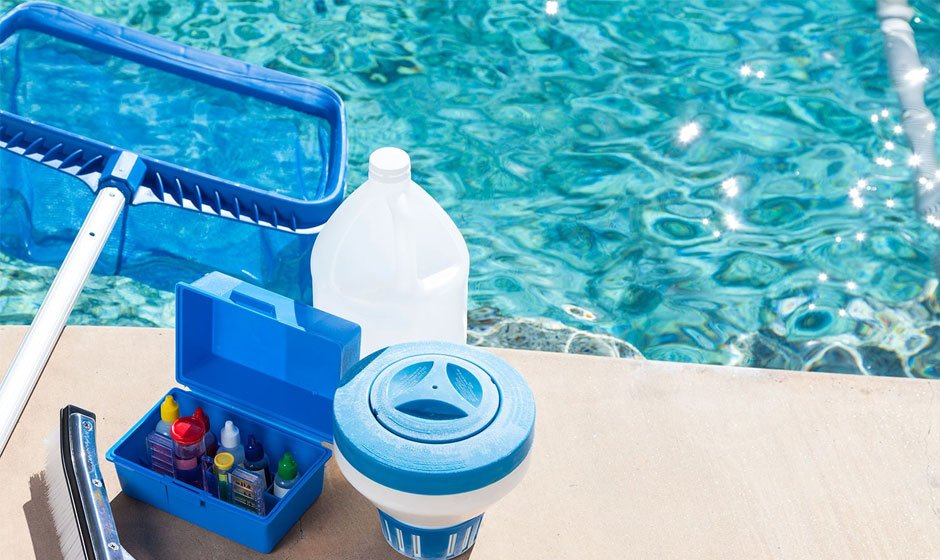Owning a swimming pool is a wonderful luxury. exercise and joy where family and friends gather to relax, exercise, and celebrate.
However, maintaining a pool involves more than just skimming leaves off the surface; it requires care and a balance of the water’s chemistry. Pool chemicals play a vital role in keeping your swimming environment safe, clean, and enjoyable.
Let’s delve into why these chemicals are essential and how they contribute to a healthy pool ecosystem.
Maintaining Water Clarity and Cleanliness
First and foremost, the clarity and cleanliness of your pool water are super important. Clear water isn’t just visually appealing; it’s also a sign of a healthy pool. This is where sanitizers, such as chlorine and bromine, come into play.
These chemicals are indispensable because they perform the critical task of killing bacteria and other pathogens that can thrive in pool water. Imagine your pool as a public space; just like any space where many individuals gather, germs can spread if not properly managed. Chlorine, the most commonly used pool sanitizer, effectively eliminates these microbes, ensuring that the water is safe for swimming.
Chlorine’s effectiveness comes from its ability to break down into various chemicals, primarily hypochlorous acid, which attacks the lipids in the cell walls of bacteria and other pathogens, destroying them.
It’s a powerful agent against contaminants introduced by swimmers, such as sweat, oils, and urine. By maintaining an appropriate chlorine level, typically between 1 and 3 parts per million, you ensure that your pool remains a safe, hygienic environment. Check out this page: https://www.rocketcitynow.com/article/news/local/pool-cleaning-expert-huntsville-explains-maintain-clean-pool/525-9719a718-9241-478f-bba3-d3b62d0e8dda.
Balancing pH Levels
While sanitizers kill bacteria, balancing your pool’s pH is equally crucial. The pH scale, which ranges from 0 to 14, measures how acidic or basic your water is. The ideal pH level for pool water is slightly basic, around 7.4 to 7.6.
This range is not only optimal for the effectiveness of chlorine but also comfortable for swimmers. Water that’s too acidic can corrode pool equipment and irritate swimmers’ skin and eyes. Conversely, water that’s too basic can cause scale formation on your pool surfaces and plumbing, which can lead to filtration problems.
Balancing pH is a continuous task, influenced by factors such as rain, the number of swimmers, and the chemicals added. To manage pH levels, pool owners use pH increasers (typically sodium carbonate) and decreasers (usually muriatic acid or sodium bisulfate) as needed. Keeping your pool’s pH within the ideal range enhances the effectiveness of other chemicals and ensures the structural longevity of your pool and comfort for its users. Find out more here.
Stabilizing Chlorine Levels
Exposure to sunlight can degrade chlorine levels in your pool, diminishing its sanitizing power. This is where cyanuric acid, often called a chlorine stabilizer or conditioner, comes into the picture. Cyanuric acid forms a shield around chlorine molecules, protecting them from the sun’s ultraviolet rays.
This process helps maintain adequate chlorine levels throughout the day, ensuring continuous disinfection and reducing the frequency and quantity of chlorine you need to add. It’s an efficient way to make pool maintenance more manageable and cost-effective.
Algae Prevention
Algae spores are constantly introduced into your pool from the environment. These spores can bloom into visible colonies that make your pool slippery, clog filters, and create an unappealing green tinge. Algicides are chemicals specifically formulated to prevent and kill algae.
While chlorine can control algae to some extent, during warm weather or in sunlit pools, an algicide serves as an effective backup, preventing algae from taking over. Regular use of algicide, according to manufacturer directions, can keep your pool pristine and extend the life of your filtration system by preventing blockages.
Water Hardness Management
Calcium hardness is another aspect of pool chemistry that needs attention. Water that is too soft can be corrosive, while water that is too hard can lead to deposits on the pool’s surfaces and equipment. Managing calcium hardness involves maintaining it within the recommended range of 200-400 parts per million.
To adjust calcium hardness, you can add calcium chloride to increase it, or use a water softener to decrease it. Proper management of calcium hardness prevents damage to the pool and ensures optimal operation of the heating system and other equipment. All you have to do is find a trusty pool chemical supplier to offer you the products you need.
Swimmer Comfort and Safety
Beyond just keeping the water clear and equipment functioning properly, using the right chemicals in your pool greatly enhances swimmer comfort and safety.
One important chemical in this regard is a water conditioner or softener, which manages the total dissolved solids in the water. This is particularly significant in areas with hard water. Hard water can lead to deposits on swimwear and uncomfortable, itchy skin after swimming. By softening the water, these conditions are alleviated, making the swimming experience more pleasant.
Moreover, the use of chemicals to maintain proper sanitation reduces the risk of waterborne illnesses. Swimmer’s ear, for example, is an unpleasant bacterial infection that can occur from swimming in water that is not adequately sanitized. Regularly using the appropriate chemicals ensures that the risk of such infections is minimized.





